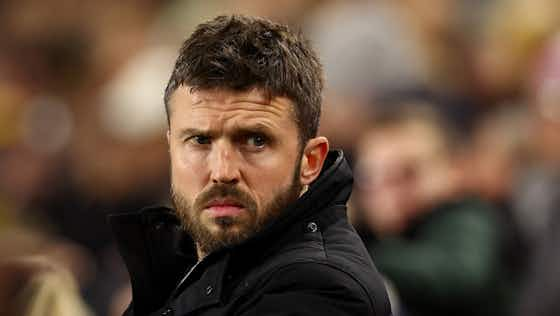Football League World
·3 September 2024
Erol Bulut must take immediate Rubin Colwill action amid ongoing Cardiff City concerns: View

In partnership with
Yahoo sportsFootball League World
·3 September 2024

Cardiff City have endured a torrid start to the season, with Erol Bulut's Rubin Colwill stance proving a real sticking point among supporters...
Despite undertaking a promising summer transfer window laden with a series of high-profile arrivals, Cardiff City have endured a wretched start to the 2024/25 Championship campaign and supporters are growing impatient with Erol Bulut's stance on Rubin Colwill.
Cardiff finished the previous campaign in 12th, which marked a huge improvement upon the plaguing battles against relegation of the past, but still contained tactical and statistical question marks to be answered for next time around by virtue of the underlying numbers beneath their league position.
Having followed up on public declarations to 'change the style', even Bulut's most ardent critics - of which there are many - cannot quite contest that Cardiff have been playing differently to last season. But is that a good thing? And, most pressingly, are Cardiff playing the right way? Are Cardiff playing in a way which not only accommodates, but indeed heightens the star quality within their side?
The answer to those questions beholds the same consistency as Cardiff's turgid inaugural form and Bulut has remedies to the glaring issues at his disposal, but his lack of current recognition towards that is only adding to the unprecedented pressure he now faces in the Bluebirds dugout.
Although internal optimism had been warned of by opposition fans - who, though not veering upon revisionism here, do largely occupy an unbiased stance - the palpable hope and expectation heading into the season among Cardiff supporters can be reasoned with.
Some of it, of course, was unfounded even then and is only further away now, but signing the likes of Anwar El Ghazi, Chris Willock, Callum Chambers, Alex Robertson and Jesper Daland would generate excitement within most Championship fanbases - and rightly so.

Cardiff's first call of duty came in their curtain-raiser at home to Sunderland on August 10. The energy and optimism around the Cardiff City Stadium was palpable that afternoon, but it had threatened to drain away somewhat as the Bluebirds slumped to a 2-0 home defeat despite, in large parts, playing well and dominating the possession stakes. In many ways, it provided a mirror image to the previous season's opener against QPR.
Latitude was less forthcoming the following weekend when, in spite of seeing more of the ball and not affording too much attacking opportunity for their opponents, Cardiff were on the receiving end of a 5-0 hammering away at Burnley, who incisively put them to the sword, punished their pedestrian nature and utilised the star quality that City fans are often used to seeing in different colours as opposed to their own.
Cardiff and Bulut both managed to save face in the early-season baptism of fire that was the South Wales Derby where, as a stark reminder of the quality in question, Rubin Colwill, Ollie Tanner and Callum Robinson all appeared from the bench to inspire a late 1-1 draw at Swansea City after a typically slow-paced, one-footed performance had seemingly consigned Wales' capital side to yet another defeat in SA1.
Saturday afternoon's 2-0 loss at home to Middlesbrough, however, was as preventable as it was inexcusable.
Optimism had already been plunged heading into the encounter after Colwill was omitted from Bulut's starting side - more on that soon - and their unsolved frailties were exploited yet again as Michael Carrick's men - very much a representation of what Cardiff are trying, but failing to be - ensured Cardiff's third loss from four games, leaving them rock bottom of the Championship ahead of the international break.

Watching Cardiff City is akin to Groundhog Day at the minute. Interminably, they will play out from the back and dominate possession. Supporters simply are not accustomed to seeing Cardiff play in a way which is principally in line with the game's conservative modernisation. That is not to say the fundamental idea is wrong - plenty of sides execute the brand of possession-based football to great effect - but Cardiff's own interpretation of the concept is most certainly flawed.

Cardiff see more of the ball and make more passes than their opponents. What they fail to do, though, is use the default possession advantage to their benefit. One-paced and one-footed, Cardiff lack speed or directness in their side. They lack the tactical invention to commit bodies forward, move the ball into dangerous areas of the pitch and have numerous options waiting to show for possession.
For a team so pragmatic, they are still remarkably easy to play through, and the telling takeaway is that Cardiff can make more than 30 consecutive passes and advance nowhere, but their opponents can make five or ten and break through on goal.
Teams who would usually look to see the majority of the ball, such as Middlesbrough and Burnley, instead chose to sit off Cardiff, conserving energy and playing a low block out of possession as they knew Cardiff simply would not do anything meaningful with it, but it would be easy to break down in the inevitable event of turnover.
Though only four games in, the magnitude of Cardiff's issues already offers statistical relevancy. They rank 22nd for big chances created (4) and xG (2.9) and, just like their league position, 24th for goals scored with only Robinson's equaliser against the Jack Army to count for.

When you add Bulut's failure to hand the supremely-talented Colwill a single starting berth in league action throughout August, it does become somewhat clearer why Cardiff look sorely out of their depth when trying to build with the ball and break teams down - even if the manager himself has separate questions to answer, too.
An average of 31 minutes a match for Colwill leaves much to be desired, and plenty of rightful questions from supporters. Cardiff are simply not a good enough team to not include a player of his quality. They do not create enough opportunities, or have quite the strength of personnel, to justify his continued omission.
A precocious and captivating talent, Colwill is a remarkably gifted and innately-inventive playmaker who can single-handedly orchestrate his side's attacking rhythm through confident and productive ball-carrying ability.

Forward freedom, of course, comes at a real premium for a side that tends to keep the handbrake on, but whenever you watch Cardiff, it is patently and invariably clear that Colwill is perhaps the only player confident and gifted enough to scour pockets of space to show for the ball, evade and deceive opponents with deft body feints and, at full throttle at least, take sheer liberties.
Perhaps the finest determinant of Colwill's ability is that he makes almost every action appear effortless. He has a near-nonchalance in possession, with his subtly-captivating body movements and knack of breezing past players sometimes giving the impression of a player operating in second gear, but at different classes to his peers. At the very top level, the very best players make everything seem like second nature.
The Welsh international has produced many marvelous displays for the Bluebirds, although he quite possibly saved his finest for last Wednesday's valiant 5-3 Carabao Cup defeat at home to Southampton. Russell Martin - a two-time public admirer of Colwill's, for what it's worth - did play a weakened side, but as did Cardiff, yet they went toe-to-toe and the mercurial midfielder was instrumental to just that.

He was at his very best, deceiving and drifting past defenders, bringing teammates into the game with his unwavering willingness to get on the ball and make things happen and, of course, producing aesthetic brilliance by plundering home an unstoppable strike from no less than 30 yards out, which restored parity to a thriller of a second-round contest.
For him to then fail to make the starting line-up against Middlesbrough over Aaron Ramsey - who, now aged 33, is no longer capable of exerting quite the same X-Factor and appears to be deteriorating at a quickening pace - was a real blow to Colwill himself, supporters in general and, in particular, those who have been unwavering in their support of Bulut. It was indefensible.
Those at Cardiff can see Colwill's talent. Interestingly, those outside of Cardiff can see Colwill's talent, too. It's clear for all to see. So why can Bulut not? Perhaps the answer is not quite as simple as Bulut not rating Colwill.
Instead, it quite possibly pertains to a real aversion to risk, an overt and counterproductive dependency upon structure and continual ball retention at the expense of maverick talent and game-changing flair.
Speaking following the defeat to Boro, Bulut cited a lack of consistency from Colwill alongside Tanner and Robinson. The same criticism, however constructive and well-intended, was not reserved for members of Cardiff's squad who will not take the risks that this trio look to do, but have been underperforming despite being handed the consistent opportunities that Colwill, Tanner and Robinson have not.

It is harsh to bemoan inconsistency from a player who has not started one league game, especially when those ahead of him have produced little of note.
Colwill is an off-the-cuff talent, a spark of creativity in an otherwise shackled and single-natured side. You always get the tantalising impression that something could just happen whenever Colwill gets on the ball - and usually it does.

But much to the frustration of supporters, his ability is simply not being optimised at a time when Cardiff need it most. The reality is that Colwill's ceiling is considerably higher than Cardiff's anyway and a departure will be inevitable if he edges any closer to realising his rich potential, so why not enjoy him while you can?
It could make or break Bulut's future in South Wales, that much is for sure.


Live





























































